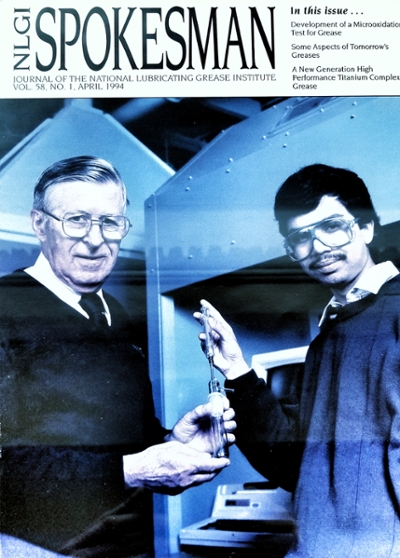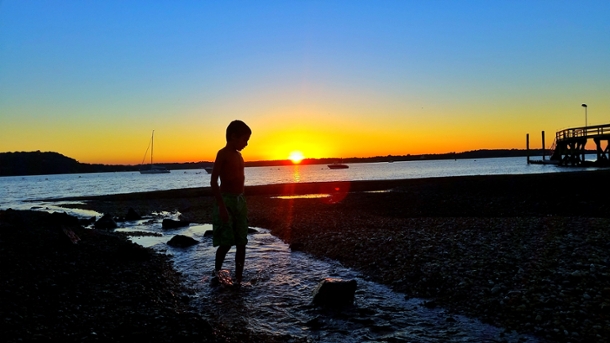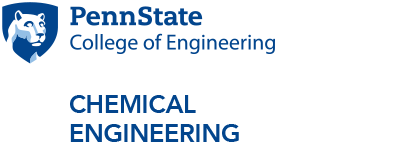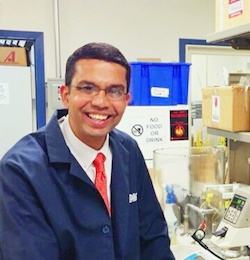Alumni Spotlight: Raj Shah, ChE '95
10/19/2018
Our latest Alumni Spotlight features Raj Shah, director of Koehler Instrument Company. Shah earned his doctorate degree from Penn State in 1995, and has more than 20 years of experience working in the oil and gas industry. He recently received multiple honors from a variety of associations.
What is your area of expertise? Also, talk a bit about what you do in a typical workday?
Our company specializes in developing and manufacturing analytical laboratory instruments specifically for the petroleum and petrochemical industry. There is a small niche market that we service, a world where fuel, lubricants or greases are manufactured, transported or used. This has been done by us for over a century. I personally am involved with the Technical Service, Marketing and Sales departments, all of which have various teams working on interesting projects.
In my role of leading these various departments, I get involved in everything from working with our team to help the American Society of Testing Materials (ASTM) develop new fuel or lube specifications to planning what conferences and trade shows the team will attend in this quarter to working with the application scientists and R & D on developing ideas for a new instrument. I enjoy the variety the job gives me and I enjoy the satisfaction of working with our team to help our customers find a complete solution to all their laboratory testing requirements. In a small company you get to wear many hats, so no two days are alike and that is always a challenge.
How does your work impact society and/or the everyday person?
We work in broader field of standardizing aviation fuel, gasoline, diesel, lubricants and greases wherever they are made or used in the world. What we essentially do is work with all the concerned parties involved and help create common standards, or specifications, and the instruments to test according to those specifications. Which are then used worldwide. So, irrespective of the fact whether you are in Lagos, Mumbai or New York, the fuel that is used to power an airplane will have those specifications, so that it can fly safely.
The same thing applies to say turbine or hydraulic lubricants. For instance, if you have all these turbines working in a nuclear power plant in Arizona or in Osaka, you need the lubricants to have certain characteristics to perform optimally and be safe and we manufacture the instruments to test those lubricants to those specifications. We also help write those standards, working closely with all the parties that have a stake in the matter.
At Penn State, I worked closely with Dr. Elmer Klaus, a world renowned tribologist, and Dr. Larry Duda, the head of chemical engineering, during my years there. I learned how to develop bench scale test methods that emulate real world problems and how to use these laboratory methods to find solutions that can help to make better lubricants, additives and materials that reduce friction, wear and oxidation.
In layman terms, having these better lubricants, greases, additives and materials would, for instance, increase the time period between oil changes in a car or helps us all to be able to use alternative fuels in vehicles, and so on. I left Penn State with a solid background in tribology, and with really good working knowledge on how to design laboratory test techniques to solve real world lubrication problems. At our company here, we work closely with interested parties and standardization organizations such as ASTM to do just that.
ASTM put out a short video not too long ago where myself and others try to explain the importance our work has on society and of the kind of standardization that we are involved in.
What are a few of the achievements so far in your career that you are proudest of?
I am a dad for the last 13 years, so trying to be a good father is what I strive for first and foremost. How successful I am, I am not sure, but I do try hard.
As far as my career goes, I have been with Koehler Instrument Company for over two decades now. I work with wonderful people here in Long Island, NY, and have been blessed to have an excellent working relationship with the president of our company. Together we all have grown our company significantly over the last 20 years and it is a pleasure to be part of such a dynamic team.
I also have been active since my days at Fenske lab with various professional organizations such as AICHE, ACS, STLE, NLGI and ASTM. I have been very fortunate to be able to continue and foster these relationships with the various professional societies, as they have always helped me in my career. In fact, I would advise every engineering student to be active in technical societies right from when one is in the university since the rewards are phenomenal.
I have been able to be where I am in my career right now mostly through the help of mentors and friends who have guided me, a company that inspires me, and a family that strongly supports what I do. Recently over the last few years I was elected by my peers as a Fellow at STLE, NLGI, AIC and EI, and that is something I was really pleased about.
Just last week I was inducted as a Fellow of the Royal Society of Chemistry in the UK and this was indeed a wonderful and surprising honor. I have also been humbled with multiple awards at ASTM over my career, and more recently with the PM Ku medal, and the Bellanti memorial award. All honors from my peers that I am greatly appreciative of.
In the last few years I was elected a Chartered Scientist by the Science Council, Chartered Chemist by the Royal society of Chemistry and a Chartered Engineer by the Engineering Council in the UK, all of which I was humbled by. Currently I am on the verge of wrapping up the second edition of the Fuels and Lubricants Handbook that I first co-edited in 2003. Over the years this has been a bestseller for ASTM, and I often see it on bookshelves in my travels to various petroleum laboratories and that always brings a smile on my face. All of this, as I said earlier, has only been possible due to the incredible support my company and coworkers have given me over the years and also the patience that my family has shown for which I am eternally grateful.
What are a few of the most valuable things you learned at Penn State?

NLGI Spokesman magazine cover featuring Raj Shah, right, and Elmer Klaus, the late Penn State professor of chemical engineering.
For me, Penn State was an eye opening experience. I had just finished my Bachelors in Chemical Engineering at Institute of Chemical Technology, in India (a very competitive university) and then came straight to State College on a research assistantship, my first experience of the United States. Our incoming class had 17 students, from seven different countries, and I must say I found the atmosphere at Penn State very welcoming and I fit right in.
Over the course of the four years my advisors Elmer Klaus and Larry Duda drilled in me the value of independent thinking, hard work and follow through on anything I was supposed to do and these lessons have stayed with me since then. They emphasized the importance of networking, and getting to know folks from industry and making connections. For example, at the sponsored tailgates we always had corporations lining up to sponsor the student AICHE tailgates in those years. Another example, the seminars that folks came to department to present, or at the conferences which they regularly made us present papers at. It was all about learning from people, getting to know them, and always being curious and not afraid to ask questions.
I also learned a lot about the world during my four years there. I met folks from all over the country and I got to be friends with so many interesting people. One of them is Niloufar Faridi, who was in my incoming class and we have been now married for 22 years. I need not tell this to anyone who is married, but as you can imagine I am still learning things from my wife, and we very often reminiscence about the flavors of ice creams at the creamery or the wonderful dollar nachos and pitcher at Surf Club or the fact that one of our names is carved behind the bar at Zeno's. I can honestly say that my time at Penn State made me the person I am today, and I am ever so grateful for that.
What's a favorite memory of your time at Penn State?
This is a tough one, as I had a wonderful four years in State College. An odd time for one of my favorite memories, but I do however remember the Storm of the Century blizzard in 1993. We were all stranded in our apartments, and somehow we decided that it would be a smart idea to walk to Fenske lab in all that snow. We got no more than a quarter of a mile, but we had an absolute blast doing it, took us a good hour to get back and nearly got ourselves frost bitten in the process.
Someone had already had a brainstorm a few days prior and had rented like eight Blockbuster videos so after we trekked back home and gathered in one apartment, we watched old movies and made interesting concoctions to drink for days on end. I also have fond memories of some of the football games and tailgates, especially when we won the NCAA National Championship in 1994. I still think we should have won it! I remember we partied all night after we beat Oregon in the Rose bowl. Those were some good times.
If you could have dinner with any three people in history, who would that be, and why?
That's a good question but not a very easy question to answer. Nicely done. Let's see.
1. Einstein: Someone who could conjure up the theory of general relativity and all such wonderful things such as the curved space time continuum would have such interesting thoughts, that it would be an absolute honor to listen to him and share a glass of wine with a genius like none other. Learning about him on a personal level over dinner, his childhood, his early life and getting to know him as a person and learn from his vast experience over a nice quiet dinner of fried eggs, mushrooms and lentil soup would be a delight.
2. Gandhi: I think it would be fascinating to listen to him and just learn from his experience about patience, forgiveness and leadership. This maverick man could bind, bond and liberate a million people. How divine then to walk the talk with him. “Live as if you were to die tomorrow, learn as if you were to live forever.” And speaking of dinner and food, he is from the same part of India as my grandparents, so while the grub would be vegetarian it would be real tasty meal that will remind me of my childhood.
3. Lincoln: To break bread with the person who abolished slavery and gave the Gettysburg Address would be chance of a lifetime that I am certain anyone who was offered it would jump at it. I do follow his principle that leave nothing for tomorrow that can be done today, so I will thank him for that insight over a meal of chicken fricassee. I would like to learn from him how to make my happiness my own responsibility and how to be patient and allow things to take their own natural course, like he once explained with the pear tree and its fruit. So much to learn, so choosing Lincoln as one of the folks I would have dinner with, is a no brainer. As he would have said: "It is altogether fitting and proper that I should have done this."
What do you like to do in your spare time?

Shah's son playing in tidal water at North Shore Beach in Long Island.
We spend quite a bit of time outdoors, and I am an active kayaker. Long Island, which has been our home for over 20-plus years now, also has wonderful beaches, so the summer is all by the water. Both Nilou and I are also active with various special needs charities and I like to cook when I can.
Reading interests have changed over time from mostly nonfiction, a decade ago, to now to a healthy mix of Nelson Demille, with some Benjamin Graham mixed in. Lately I have acquired a couple of new hobbies. I am trying mixology. I have always been experimenting with various drink recipes last few years, and after umpteen tries, one recipe, “The Raj” recently made it on a drink menu for a couple of weeks at a local upscale restaurant in my town.
“The Raj” is an eclectic sangria and I am glad to share the recipe. It’s one-part lychee liquor, half-part Cointreau, half-part Chambord, three-parts chardonnay. This is mixed with cut peaches, apples, orange and grapes and marinated for up to eight hours. Mix this with ice and three parts pomegranate juice while serving, garnishing the drink with a rosemary twig.
I have also taken up mobile photography of late. I am learning to try and capture the moment, and getting the hang of editing and composing the final image. It is a work in progress. Both Nilou and I are also movie and TV buffs, so nowadays that means a lot of Netflix and all Penn State football games of course) and I still enjoy playing racquet sports when I can.




